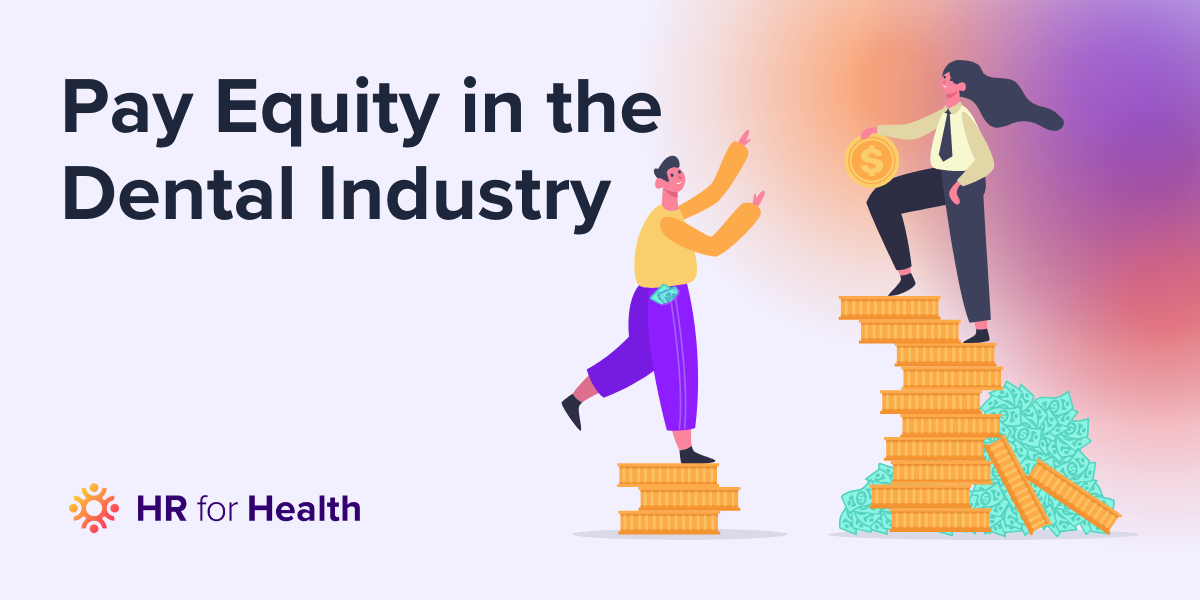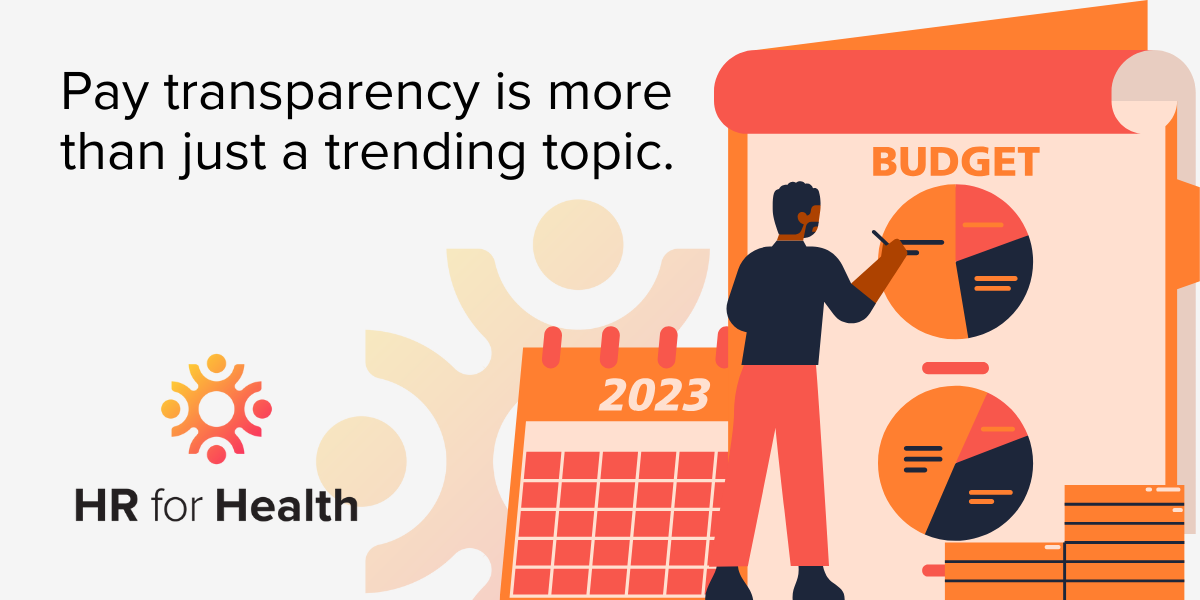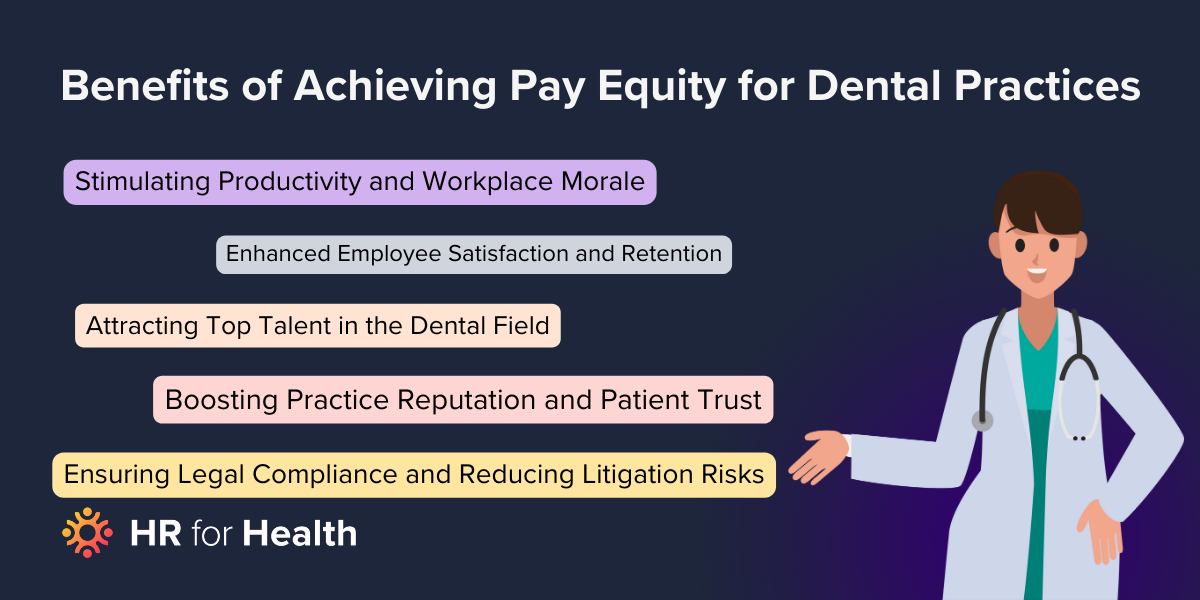In the evolving landscape of employee rights and compensation, the dental industry has not been exempt from the broader discussions of pay equity. As with many professions, understanding compensation dynamics is crucial for both practice owners and employees. By fostering transparent conversations around pay, dental practices can not only ensure fairness but also attract and retain top talent. The momentum behind this movement is supported by new legislation and societal shifts that prioritize equitable compensation.

As a response to growing awareness, various states have put forward regulations to address pay disparities. Among these, the California pay transparency law stands out as a leading example, underscoring the state’s commitment to fair compensation. In addition, by 2023, several states followed suit, prompting the need for a closer look at pay transparency laws by state. You need to make sure that your dental practice is in compliance if you want to avoid fines and sanctions, so what do you need to know? Learn more below, and do not hesitate to reach out to an expert who can help you.
Historical Overview: Pay Discrepancies in Dentistry
Historically, the dental profession has seen its share of pay discrepancies, often based on factors unrelated to skills or experience. Gender and racial biases, in particular, have been significant contributors to wage gaps. As the industry has grown, so has the realization that such disparities harm not only individual practitioners but the field at large. Addressing these imbalances is not just a matter of justice but also of maintaining the industry’s reputation and standards.
Over the years, different states with pay transparency laws have put forth measures to mitigate these discrepancies. For instance, states requiring pay transparency have noticed a positive shift in narrowing wage gaps. Still, there remains a long road ahead. Dental practices, regardless of size, have a responsibility to understand these laws and apply them consistently. What do you need to know?
Why Pay Transparency Matters in the Dental Sector
Pay transparency is more than just a trending topic. It’s a reflection of a practice’s commitment to fairness, accountability, and excellence. When employees understand how their pay is determined, they feel valued and respected. This understanding also builds trust and fosters a positive workplace culture.
The reality is that pay transparency promotes fairness, reduces misunderstandings, and contributes to an inclusive work environment. When employees are confident that they’re being compensated fairly, they’re more likely to remain engaged, loyal, and motivated. In addition, understanding the pay equity definition can help practices navigate these conversations more effectively.

What Does Internal Pay Equity Look Like in a Dental Practice?
At its core, internal pay equity ensures that employees in the same role, with comparable experience and skills, receive similar compensation. It’s about ensuring that no bias, whether conscious or unconscious, influences pay decisions. By adhering to this principle, dental practices can promote a culture of fairness and inclusivity. When employees feel confident that their pay is an accurate reflection of their value, they are more likely to work harder for the practice and get along with their coworkers, fostering a positive company culture.
Furthermore, addressing pay equity isn’t just about meeting legal standards. It’s a proactive step that can boost morale, reduce turnover, and foster a sense of belonging among employees. When pay decisions are made based on objective criteria, employees feel that their contributions are genuinely valued.
Pay Equity Should Be an Integral Part of Your Compensation Strategy
Dental practices should prioritize pay equity not just as a compliance issue but as a strategic move. Integrating pay equity into your compensation strategy signals a commitment to fairness and can distinguish your practice from competitors. In a sector where attracting skilled professionals is crucial, standing for pay equity can give you an edge.
Furthermore, with tools like pay equity software, achieving and maintaining this balance has become more straightforward than ever. Practices can now analyze compensation data with precision, ensuring that disparities are promptly identified and addressed. This proactive approach not only safeguards against potential legal issues but also fosters a culture of transparency and trust. HR for Health would be honored to help you implement this strategy.
Benefits of Achieving Pay Equity for Dental Practices
Achieving pay equity in the dental sector has myriad benefits. Some of the top benefits of pay equity for dental practices include:
Enhanced Employee Satisfaction and Retention
Employees who believe their compensation is fair will likely remain with a practice long-term. They feel valued and understood, leading to increased job satisfaction. Transparent pay structures can significantly reduce turnover, as employees see fewer reasons to seek opportunities elsewhere.
In addition, when a dental practice takes the time to explain compensation structures and ensures they are equitable, it fosters a positive workplace environment. Employees don’t just stay because of their pay but because they feel respected and heard.
Attracting Top Talent in the Dental Field
In the competitive dental industry, top talent often has multiple offers to consider. Offering transparent and equitable pay can set your practice apart. Candidates are increasingly looking for employers who prioritize fairness and transparency, and showcasing your commitment can make your practice more appealing.
Furthermore, word travels fast in professional circles. When your practice is known for its fair compensation, it becomes a magnet for top-tier professionals, ensuring that you always have access to the best talent available.
Boosting Practice Reputation and Patient Trust
Patients trust dental practices not only for their clinical expertise but also for their ethical stance. A reputation for equitable pay can bolster your practice’s image in patients’ eyes. They feel confident entrusting their oral health to a dental practice that treats its employees fairly.
In addition, practices that prioritize pay equity often find that their employees are more motivated and engaged. This positive energy is palpable to patients, further enhancing their trust and loyalty to the practice.
Stimulating Productivity and Workplace Morale
Fair pay is a strong motivator. When employees know their compensation reflects their skills and contributions, they are more inclined to put in their best work. This boost in productivity benefits both the practice and its patients.
Furthermore, when discrepancies in pay are eliminated, it reduces potential sources of workplace tension. A happy workplace, where employees feel valued, naturally boosts morale and fosters a collaborative spirit.
Ensuring Legal Compliance and Reducing Litigation Risks
In many states, adhering to pay equity standards is ethically right and legally required. By ensuring compliance, dental practices can avoid costly lawsuits and legal complications. States like California have stringent regulations, and being abreast of these can save dental practices from unnecessary legal entanglements.
By actively seeking to understand what states have pay transparency laws and ensuring adherence, practices safeguard themselves. Furthermore, this proactive approach can also result in financial savings in the long run.

Ensuring Pay Equity Can Reduce Turnover Rates
A significant benefit of prioritizing pay equity is the potential reduction in turnover rates. Employees who feel undervalued due to pay discrepancies are more likely to seek employment elsewhere. By addressing these discrepancies, practices can enhance employee loyalty and retention.
Turnover is not just a logistical challenge; it’s also a costly affair. Hiring and training new staff requires time, resources, and money. By reducing turnover through pay equity, practices can allocate these resources more effectively, focusing on growth and patient care.
Steps Dental Practices Can Take to Ensure Pay Equity
Ensuring pay equity requires a systematic approach, and dental practices can take several steps to achieve this. They include:
Conducting Regular Pay Audits to Identify Discrepancies
Regular pay equity audits are essential to identify and address any discrepancies. By comparing compensation data across roles and departments, practices can pinpoint areas that require attention. It’s not just about identifying issues; it’s about finding solutions.
With the help of tools like pay equity audit software, these assessments become even more accessible and accurate. By leveraging technology, practices can ensure that their compensation structures remain fair and equitable.
Implementing Transparent Salary Structures
Transparency is at the heart of pay equity. By establishing clear salary structures and sharing them with employees, practices foster trust and understanding. When employees know the criteria determining their pay, it eliminates guesswork and potential misunderstandings.
Furthermore, transparent salary structures make it easier for practices to ensure consistency. By following a clear framework, compensation decisions become more objective and less prone to biases.
Promoting Diversity and Inclusion Training Within the Practice
Diversity and inclusion training can play a pivotal role in fostering a culture of pay equity. By educating staff about unconscious biases and the importance of equitable compensation, practices can ensure that these principles are consistently applied.
Next, this training can lead to a broader cultural shift within the practice. When staff understands the value of diversity and inclusion, it positively impacts all areas of operations, from patient care to administrative tasks.
Establishing Clear Criteria for Promotions and Bonuses
Just as with base pay, bonuses, and promotions should also be based on clear and objective criteria. By outlining and consistently applying these criteria, practices can avoid potential biases and discrepancies.
It’s crucial to remember that these criteria should be periodically reviewed and updated. As the practice evolves and grows, its compensation structures should also adapt to reflect current realities.
Engaging External Experts for Unbiased Compensation Reviews
Sometimes, an external perspective can be invaluable. By engaging external experts to review compensation structures, practices can gain insights that might be overlooked internally. These experts bring a fresh set of eyes and can provide recommendations to ensure pay equity.
Having an external review can also serve as a validation for the practice. It demonstrates a commitment to fairness and transparency, further enhancing the practice’s reputation. It would be our pleasure to help you with this external review.
Contact HR for Health For Help With Pay Equity in Your Dental Practice
Navigating the complexities of pay equity can be challenging, but you don’t have to do it alone. HR for Health specializes in providing HR services tailored for dental practices. With expertise in the nuances of the dental industry, we can guide you in ensuring your compensation structures are fair, transparent, and compliant.
By partnering with HR for Health, you can focus on what you do best: providing top-notch dental care. Let the experts handle the intricacies of pay equity, ensuring your practice remains at the forefront of fairness and excellence. Contact us today!


